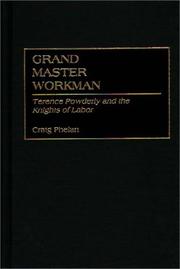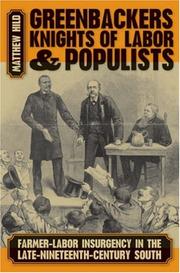| Listing 1 - 3 of 3 |
Sort by
|

ISBN: 0313309485 1567508847 9781567508840 Year: 2000 Publisher: Westport, Conn. Greenwood Press
Abstract | Keywords | Export | Availability | Bookmark
 Loading...
Loading...Choose an application
- Reference Manager
- EndNote
- RefWorks (Direct export to RefWorks)
BUSINESS & ECONOMICS --- Economics / General --- Business & Economics --- Labor & Workers' Economics --- Labor unions --- Labor movement --- Radicalism --- History. --- Powderly, Terence Vincent, --- Knights of Labor --- Extremism, Political --- Ideological extremism --- Political extremism --- KofL --- Noble Order of the Knights of Labor --- National Assembly of the Knights of Labor --- Knights of Labor of America --- Political science --- Socialist Trade and Labor Alliance

ISBN: 0820328979 9786612552908 0820336564 1282552902 9780820336565 9780820328973 9781282552906 6612552905 0820357081 Year: 2007 Publisher: Athens : University of Georgia Press,
Abstract | Keywords | Export | Availability | Bookmark
 Loading...
Loading...Choose an application
- Reference Manager
- EndNote
- RefWorks (Direct export to RefWorks)
Historians have widely studied the late-nineteenth-century southern agrarian revolts led by such groups as the Farmers' Alliance and the People's (or Populist) Party. Much work has also been done on southern labor insurgencies of the same period, as kindled by the Knights of Labor and others. However, says Matthew Hild, historians have given only minimal consideration to the convergence of these movements. Hild shows that the Populist (or People's) Party, the most important third party of the 1890s, established itself most solidly in Texas, Alabama, and, under the guise of the earlier Union Labor Party, Arkansas, where farmer-labor political coalitions from the 1870s to mid-1880s had laid the groundwork for populism's expansion. Third-party movements fared progressively worse in Georgia and North Carolina, where little such coalition building had occurred, and in places like Tennessee and South Carolina, where almost no history of farmer-labor solidarity existed. Hild warns against drawing any direct correlations between a strong Populist presence in a given place and a background of farmer-laborer insurgency. Yet such a background could only help Populists and was a necessary precondition for the initially farmer-oriented Populist Party to attract significant labor support. Other studies have found a lack of labor support to be a major reason for the failure of Populism, but Hild demonstrates that the Populists failed despite significant labor support in many parts of the South. Even strong farmer-labor coalitions could not carry the Populists to power in a region in which racism and violent and fraudulent elections were, tragically, central features of politics.
POLITICAL SCIENCE --- General --- Labor unions --- Working class --- Farmers --- Populism --- Business & Economics --- Labor & Workers' Economics --- History --- Political activity --- Knights of Labor. --- Southern States --- Race relations --- Farm operators --- Operators, Farm --- Planters (Persons) --- Commons (Social order) --- Labor and laboring classes --- Laboring class --- Labouring class --- Working classes --- Industrial unions --- Labor, Organized --- Labor organizations --- Organized labor --- Trade-unions --- Unions, Labor --- Unions, Trade --- Working-men's associations --- Employment --- KofL --- Noble Order of the Knights of Labor --- National Assembly of the Knights of Labor --- Knights of Labor of America --- Political science --- Agriculturists --- Rural population --- Social classes --- Labor --- Labor movement --- Societies --- Central labor councils --- Guilds --- Syndicalism --- Socialist Trade and Labor Alliance
Book
ISBN: 9781781383537 9781781384145 1781384142 1781383537 1781383189 9781781383186 1786944030 Year: 2016 Publisher: Liverpool : Liverpool University Press,
Abstract | Keywords | Export | Availability | Bookmark
 Loading...
Loading...Choose an application
- Reference Manager
- EndNote
- RefWorks (Direct export to RefWorks)
The Noble and Holy Order of the Knights of Labor, the first national movement of the American working class, began in Philadelphia in 1869. Millions of Americans, white and black, men and women, became Knights between that date and 1917. But the Knights also spread beyond the borders of the United States and even beyond North America. Knights Across the Atlantic tells for the first time the full story of the Knights of Labor in Britain and Ireland, where they operated between 1883 and the end of the century. British and Irish Knights drew on the resources of their vast Order to establish a chain of branches through England, Wales, Scotland and Ireland that numbered more than 10,000 members at its peak. They drew on the fraternal ritual, industrial tactics, organisational models, and political concerns of their American Order and interpreted them in British and Irish conditions. They faced many of the same enemies, including hostile employers and rival trade unions. Unlike their American counterparts they organised only a handful of women at most. But British and Irish Knights left a profound imprint on subsequent British labour history. They helped inspire the British "New Unionists" of the 1890s. They influenced the movement for working-class politics, independent of Liberals and Conservatives alike, that soon led to the British Labour Party. Knights Across the Atlantic brings all these themes together. It provides new insights into relationships between class and gender, and places the Knights of Labor squarely at the heart of British and Irish as well as American history at the end of the nineteenth century.
Gewerkschaft --- Labor unions. --- Labor unions --- History --- Knights of Labor --- Knights of Labor. --- 1800-1899 --- Irland --- Grossbritannien --- Ireland. --- Great Britain. --- Industrial unions --- Labor, Organized --- Labor organizations --- Organized labor --- Trade-unions --- Unions, Labor --- Unions, Trade --- Working-men's associations --- Labor movement --- Societies --- Central labor councils --- Guilds --- Syndicalism --- Noble Order of the Knights of Labor --- KofL --- National Assembly of the Knights of Labor --- USA --- Knights of Labor of America --- Socialist Trade and Labor Alliance --- Irish Free State --- Storbritannien --- Anglia --- Wielka Brytania --- Nagy-Britannia --- United Kingdom --- United Kingdom of Great Britain and Ireland --- United Kingdom of Great Britain and Northern Ireland --- Grande-Bretagne --- Angliyah --- Briṭanyah --- Velikobritanii︠a︡ --- Saharātchaʻānāčhak --- Marea Britanie --- Prydain Fawr --- Royaume-Uni --- Iso-Britannia --- Yhdistynyt kuningaskunta --- Förenade kungariket --- Grã-Bretanha --- בריטניה --- イギリス --- Igirisu --- Northern Ireland --- Scotland --- Wales --- England and Wales --- Irlande --- Éire --- Poblacht na hÉireann --- Republic of Ireland --- Írország --- Irlanda --- Irish Republic --- Airlann --- アイルランド --- Airurando --- Irlanti --- Staat Irland --- Éire --- Poblacht na h'Eireann --- Republik Irland --- Saorstát Éireann --- Ireland --- Eire --- Insel --- Iren --- Vereinigtes Königreich von Großbritannien und Nordirland --- Großbritannien und Nordirland --- England --- UK --- Angleterre --- Brīṭāniyā al-ʿUẓmā --- Brīṭāniya 'l-ʿUẓmā --- Vereinigtes Königreich Großbritannien und Nordirland --- Great Britain --- Grande Bretagne --- British Isles --- Gran Bretagna --- U.K. --- GB --- British Empire --- Britisches Reich --- Briten --- Schottland --- Commonwealth --- 1707 --- -Airlann --- Velikobritanii͡ --- Labour --- Labor --- Smethwick --- Trade union --- United States --- Working class
| Listing 1 - 3 of 3 |
Sort by
|

 Search
Search Feedback
Feedback About UniCat
About UniCat  Help
Help News
News